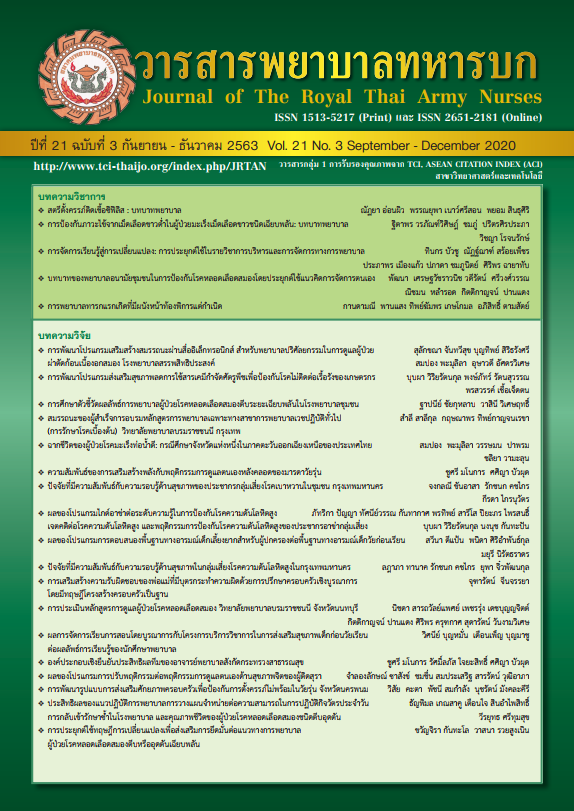Factors Related to Health Literacy among High Risk Diabetes Mellitus Population in Bangkok Community
Keywords:
Health Literacy, High Risk Diabetes Mellitus PopulationAbstract
The purpose of this research was to study the correlation among factors such as income, perceived health status, caregiver, social support, access to care, the 3E 2S policy and health literacy among a high-risk diabetes mellitus population in Bangkok. The sample was 230 high-risk diabetes mellitus, people aged 18 - 59 years, both male and female in Bangkok community. The samples were obtained by simple random sampling by using questionnaires, consisting of a demographic questionnaire, perceived health status questionnaire, social support questionnaire and health literacy questionnaire according to ‘3E 2S’ policy in population at high-risk diabetes mellitus. Data were analyzed by using descriptive statistics, Pearson product - moment correlation coefficient and point-biserial correlation coefficients.
The results show that the high risk diabetes mellitus population had moderate overall health literacy (56.1%) and the factors related to health literacy among the high risk diabetes mellitus with statistical significance include income, perceived health status, social support, access to care and the 3E 2S policy. It was found that the factor that was not related to health literacy among the high-risk diabetes mellitus population was care giver From the study, proactive service system model should be developed to enhance health literacy by considering income, perceived health status Social support Providing services that are easily accessible And support awareness and access to 3E 2S policy
Downloads
References
Bureau of Non-Communicable Diseases, Department of Disease Control, Ministry of Public Health. Statistics on non-communicable diseases Chronic [Internet]. 2017 [cited 2018 sep 12].
Office of Social Development Bangkok. Bangkok Community Information Statistics [Internet]. 2018 [cited 2018 sep 12].
Ministry of Public Health Health Promotion Division, Bureau of Health Bangkok. Diabetes risk group, fiscal year 2015-2017. Bangkok Health Office; 2018 December 19. Report No.: Bangkok 1706/10242.
Ekkapakorn W, Chaicharoen H, Sathiannopkao W, Thaikla K. Report of the 5th Thai Health Survey by Health Checkup 2014. Health System Research Institute. Nonthaburi: Graphic and Design Font Partnership LP Rojanaphanrat (2016). (in Thai)
Office of Disease Prevention and Health Promotion. America´s Health Literacy: Why We Need Accessible Health Information, health. gov. Washington DC: U.S. Department of health & Human Service.Penchansky, R., & Thomas, J. W. (1981). The concept of access: definition and relationship to consumer satisfaction. Medical care. 2015: 127-140.
Suka M, Odajima T, Okamoto M, Sumitani M, Igarashi A, Ishikawa H, Kusama M, Yamamoto M, Nakayama T, Sugimori H. Relationship between health literacy, health information access, health behavior, and health status in Japanese people. Patient education and counseling. 2015 May 1;98(5):660-8.
Duong VT, Lin IF, Sorensen K, Pelikan JM, Van Den Broucke S, Lin YC, Chang PW. Health literacy in Taiwan: a population-based study. Asia Pacific Journal of Public Health. 2015 Nov; 27(8):871-80.
World Health Organization. Global status report on noncommunicable diseases 2014. Geneva: World Health Organization; 2014. Google Scholar. 2016.
Health Education Division, Department of Health Service Support In collaboration with the Behavioral Science Research Institute Sri Nakarintharawiroth university. A guide to assessing health intelligence of Thai people aged 15 years and over in compliance with the principles of 3E. 2S. Nonthaburi: 2013. (in Thai)
Phaiboonsiri P. Health literacy and health behaviors 3E 2S of public sector executives, Phra Nakhon Si Ayutthaya province Journal of the Preventive v Medicine Association of Thailand, 2018 ;8(1):97–107. (in Thai)
Intarakamhang A. Behavioral Science Research InstituteSrinakharinwirot University Creating and Developing of Thailand Health Literacy Scales. Complete report [Internet]. 2017 [cited 2018 sep 30]. (in Thai)
Khumthong T. A Causal Model and Effect of Health Literacy To Health Behavior and Health Outcome of Risk Thai Adults With Diabetes and Hypertension in Uthai Thani and Ang Thong Provinces. (Doctoral dissertation). Bangkok: Chulalongkorn University; 2016. (in Thai)
Luejai S, Fucharoenkanyar Ch, and Wichit S. The health literacy of people at risk about Diabetes and High blood pressure in responsible at “BAN PANG RIM KORN TAMBON” Health promoting hospital, Muang distric, Chingrai province. Chiangrai Medical Journal, 2558;7(2): 19-2. (in Thai)
Chaisuwan W. Health Knowledge: Concepts and Application to Nursing Practice. Royal Thai Navy Medical Journal. 2017;44(3):183-97. (in Thai)
McLeroy KR, Bibeau D, Steckler A, Glanz K. An ecological perspective on health promotion programs. Health education quarterly. 1988; 15(4):351-77.
Tachavijitjaru C. Health Literacy: A key Indicator towards Good Health Behavior and Health Outcomes. Journal of The Royal Thai Army Nurses 2018;19 (supplement):1-1. (in Thai)
Liu LI, Yanfei LI, Hua YA, Qingquan CH, Yongbing LI, Yanru WA, Fang LIANG YC. The health literacy status and influencing factors of older population in Xinjiang. Iranian journal of public health. 2015 Jul;44(7):913.
Wongnisanatkul K. Health Intelligence of Diabetic Patients Attending the Family Practice Center at Phra Nakhon Si Ayutthaya Hospital. Journal of Preventive Medicine Association of Thailand. 2018 May 31;8(1):49-61. (in Thai)
Chantha W. Health intelligence in self care behavior. And blood glucose control of type 2 diabetic patients, Chai Nat province. Borommarajonani College of Nursing, Nakhon Ratchasima. 2018 Dec 28;24(2):34-51. (in Thai)
Downloads
Published
How to Cite
Issue
Section
License
บทความหรือข้อคิดเห็นใดใดที่ปรากฏในวารสารพยาบาลทหารบกเป็นวรรณกรรมของผู้เขียน ซึ่งบรรณาธิการหรือสมาคมพยาบาลทหารบก ไม่จำเป็นต้องเห็นด้วย
บทความที่ได้รับการตีพิมพ์เป็นลิขสิทธิ์ของวารสารพยาบาลทหารบก
The ideas and opinions expressed in the Journal of The Royal Thai Army Nurses are those of the authors and not necessarily those
of the editor or Royal Thai Army Nurses Association.






